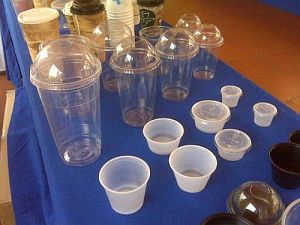Sayulita, Mexico - We all know the horrors of Styrofoam for the environment. Its decomposition rate is akin with never, it often ends up polluting the ocean and is toxic when burned. Though I love takeout as much as the next person, I am conscious of the serious, negative impact of Styrofoam, and especially, restaurant to-go containers.
I have been known to wash the clamshell containers and bring them to a restaurant if ordering to-go, to bring my own plastic storage containers for restaurant leftovers and much to the chagrin of my husband, have also been known to haul the clamshell containers back to the U.S., where Styrofoam is recyclable in the county where our cabin is.
Eric Steinman, a volunteer with Grupo Pro Sayulita, has been one of the chairpersons of the recycling program for the past year in Sayulita, along with Tracie Willis. Steinman has also introduced biodegradable containers to Sayulita, made out of corn starch and sugarcane. As of last season, Sayulita's Friday Farmer's Market was not only Organic, but Styrofoam-free.
Tracie Willis, of Chocobanana and a tireless Sayulita activist, is bringing a distributor from Guadalajara, Gregorio Lechuga, from the company Comercializado Pituche, to showcase the company's full line of restaurant-oriented biodegradable, compostable and recyclable containers. Both for in-restaurant use and as to-go containers, Pituche's products are made from sugarcane fibers and other earth-friendly products.
It is Willis' hope that Eric Steinman will be the local distributor of Pituche's products, bringing earth-friendly containers to a much wider audience in Sayulita. Restaurants and other businesses could use these containers to attract earth-friendly-conscious customers.
This particular green movement could also be quite a boon to Mexico, as the containers are made mostly of corn starch and sugarcane fibers and Mexico is already one of the world's largest producers of corn and sugarcane.


